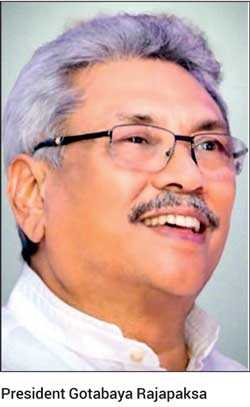Monday Feb 16, 2026
Monday Feb 16, 2026
Saturday, 13 June 2020 00:08 - - {{hitsCtrl.values.hits}}
A mega task force
In June 2018, the Anunayake of the Asgiriya Chapter, Ven. Vedaruvey Upali Thera, when delivering his Anusasana at a Sanghika Dana at President Gotabaya Rajapaksa’s residence at Mirihana and in the presence of three of his siblings, Mahinda, Chamal and Basil, apart from other VIPs, unashamedly urged GR to assume the mantle of a Hitler if necessary to build up the country, which, during Yahapalanaya had become politically corrupt and irreparably factional, economically bankrupt and socially fractious.
Although GR did not immediately reject that atrocious appellation crowned upon him, two years later, the prelate’s wish seems to be shaping into a presidential dictatorship. Step by step, through appointment of handpicked military men to head a variety of task forces, by placing henchmen at crucial decision making positions in vital institutions including the Central Bank, by dispatching the army to all districts in the name of assisting national development, and by ordering dissenters of these moves to state their criticisms and quit, GR has paved the way for an emerging political order of dictatorship.
His appointment of a new but mega task force (MTF), with undefined but broad powers, to build a “secure, disciplined, virtuous and lawful society” may be noted as the culmination of this push. The President’s task forces have become his signature mark to sanctify what he described as “vistas of prosperity and splendour”, in his address to the parliament before dissolving it.
 With the MTF, headed once again by Generals, militarisation of the country’s civil and judicial administration, has taken another giant step towards completion. Although the gazette notification spells out the purpose of MTF is to prevent “illegal and anti-social activities”, such as drug addiction and mafia-controlled businesses in narcotics, it has, as journalist Tharanga Jayasuriya correctly pointed out “left a too broader purview and in theory too much arbitrary power in interpreting what they are” (Daily Mirror, 9 June). He was also on the money when he added that, “organised crime in Sri Lanka is a law and order problem that should be tackled by the criminal justice system”.
With the MTF, headed once again by Generals, militarisation of the country’s civil and judicial administration, has taken another giant step towards completion. Although the gazette notification spells out the purpose of MTF is to prevent “illegal and anti-social activities”, such as drug addiction and mafia-controlled businesses in narcotics, it has, as journalist Tharanga Jayasuriya correctly pointed out “left a too broader purview and in theory too much arbitrary power in interpreting what they are” (Daily Mirror, 9 June). He was also on the money when he added that, “organised crime in Sri Lanka is a law and order problem that should be tackled by the criminal justice system”.
What has happened through this MTF is backdoor encroachment into the legitimate territory of the Judiciary. It is another calculated step in GR’s move to become the most supreme leader with absolute powers. Absolute power corrupts absolutely. To be fair by the President, he would rather prefer to grab these powers through the legislative process. This is why the coming election is critical, and MTF appointed on the eve of that election has a contextual relevance.
Critical election
The spirit of democracy in Sri Lanka has been in serious for a long time, but its outer manifestation in the form of political parties, public campaigns, periodic elections and adult suffrage still survive. Thus another election has been announced by the Election Commission to be held on 5 August. How that is election going to be conducted is still not known. However, more than anyone else, it is President GR who want the election to be held soon, because he desperately needs MR-led SLPP to emerge victorious with two-third majority.
Such a conclusive victory would facilitate the total empowerment of GR through the constitutional process. Longer the election is put off the more difficult will it be to achieve absolute majority, because economic difficulties are mounting daily, which may turn more and more voters against the Rajapaksa clan.
The appointment of the MTF with arbitrary powers is therefore relevant in the context of the election. MTF can play a crucial but subtle role in securing the desired outcome to the president’s camp. In all probability, voter turnout in this election will be the lowest in the nation’s history. Voting is not compulsory in Sri Lanka. Who then would want to go to the polling booth and vote, when pressure of economic survival preoccupies people’s energy and attention?
Moreover, their bitter experience with security forces during recent curfews and lockdowns would deter many of them not to take another risk by going to the polling stations where fully armed security personal would be present. It is also doubtful whether the election would be free of vote rigging and fraud this time, because securing victory with two-third majority is absolutely vital for the regime and all means to achieve it will be assumed permissible. In all probability, with MTF in operation, SLPP should have too many advantages.
However, there is an outside chance for the opposition, if it is united and determined, to checkmate SLPP, because mounting economic difficulties and voter dissatisfaction with GR-MR’s economic management can help its cause. If that possibility arises what would be the role of MTF is anybody’s guess. Therefore, in every sense this election is extraordinarily critical to the country’s democratic future. All this is going to take place amidst a rapidly-deteriorating economic situation.
Contracting economy
Very recently, World Bank has come out with a more dreadful prediction than the IMF, of a 5.2 per cent drop in world economy this year. This would mean a deeper and prolonged recession than what IMF envisaged earlier. To an economy like that of Sri Lanka, which had over enthusiastically thrown open its doors to global market forces, domestic recovery is strongly correlated to recovery outside. In spite of all the assurances from the Governor of Central Bank, ordinary families will struggle for economic survival for years to come and poverty will increase, with its associated consequences such as malnutrition, starvation and even suicide.
After the election, whichever party or parties that form government, cost of living will increase steeply, because government taxes have to be increased to make up for lost revenue since GR came to power. Servicing foreign debt may be delayed for some time, but they have to be serviced sooner or later. Even then, additional borrowing cannot be avoided.
Overseas remittances will fall; foreign direct investment will take time to reach its pre-COVID-19 level, and even then the country would have to offer more attractive terms for investors to come in; tourism industry will continue to suffer until tourists, especially the elderly, who are a big chunk among affluent tourists, feel confident to travel abroad without falling victim to another bout of the deadly virus; and local industrial exports, such as apparels and garments, will struggle to grow until our trading partners regain their growth.
Given this dire scenario, at least in the food sector Sri Lanka should and can reach self-sufficiency, if proper measures are taken by the Government. A few lessons can be learnt from 1970s when the leftist coalition implemented its import substitution policies. There were initial food shortages but eventually the situation improved.
Market gardening in the north prospered and the east became the nation’s rice basket. Yal Devi express train earned the sobriquet, Hal Devi, carrying rice to the north and bringing chillies, onions and other condiments from there to the south. The central highland specialised in vegetables, such as potatoes and B-onions which were previously imported from India. Sri Lanka even produced its own brand of Maldive fish.
The Multi-Purpose Co-operative Society and People’s Bank were in the forefront of this agricultural awakening. Even school children through shramadana projects got involved in food production. Of course, there were shortages in certain areas but overall, food production was a qualified success. The most important aspect of this food drive was that the entire nation was behind it. Unfortunately, it all came to a premature end with JRJ’s open economy.
To revive at least some aspects of this food drive there must be peace and unity in society, which unfortunately is not there at the moment. The battle for economic recovery should be a collective national effort and not the sole responsibility of just one section of the population, even if that section is the majority.
Although the President says that he governs for all, so far he has not put his words into action. This is his fundamental problem. Because there is disunity he has to rely more and more on security forces, and on his native informers to canvass for him. The coming election is certain to whip up some divisive issues targeting particular communities. This is a recipe for continuous division and distrust and is not going to help rescuing an economy that is in serious trouble.
(The writer is attached to the School of Business and Governance, Murdoch University, Western Australia.)